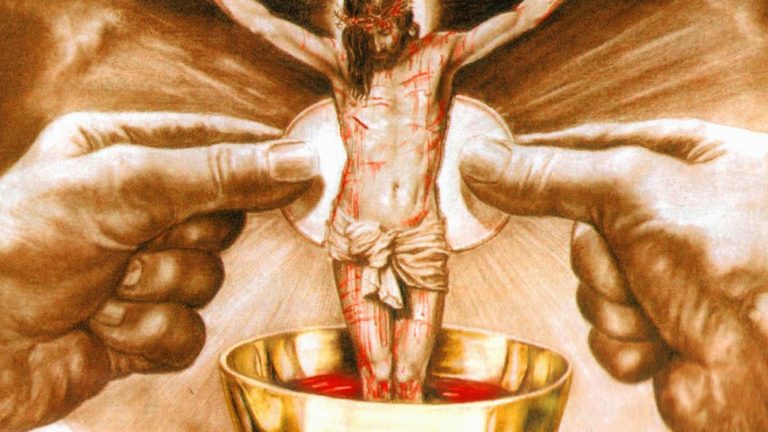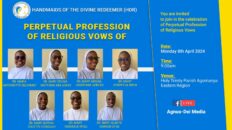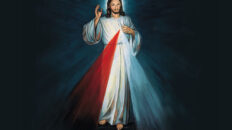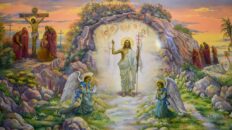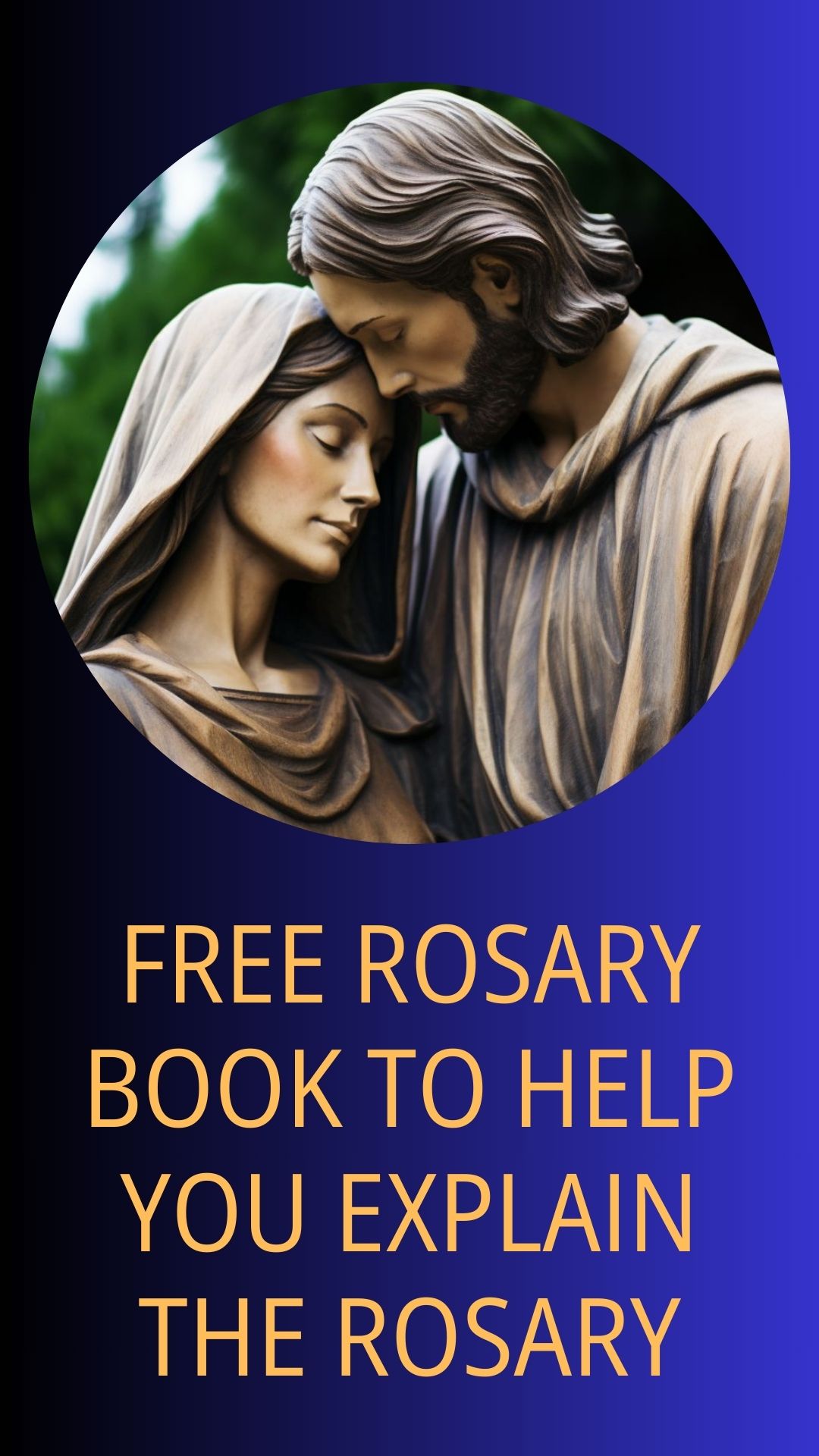A TALK AT THE MADINA DEANERY EUCHARISTIC CONGRESS
AT THE QUEEN OF PEACE CHURCH, ON NOVEMBER 25, 2023
BY BISHOP JOHN KOBINA LOUIS
TOPIC: THE EUCHARIST: SOURCE OF HEALING AND EMPOWERMENT
INTRODUCTION
Beloved, I wish to thank your Dean, V. Rev. Fr. Nimorius SMA, the Madina Deanery Eucharistic Congress Planning Committee, the priests, religious and all of you for this privilege to talk about one of my most cherished teachings of the Church, namely, the Eucharist. Indeed, we should all not only cherish talking about the Eucharist but cherish the more its reception. Our topic for today is “The Eucharist: Source of Healing and Empowerment”. Through this talk, we are reminded that:
- In the Holy Eucharist, we truly receive our Lord Jesus Christ, the very and only Begotten Son of God
- The Lord who healed many in the past continues to heal us in the Eucharist
- The Lord who empowered the apostles and disciples in the past continues to empower us in the Eucharist
OUTLINE
- The term “Eucharist”
- Other names of the sacrament
- Memorial of the sacrificial death of Christ
- The Real Presence of Christ in the Eucharist
- The Eucharist as a source of healing
- The Eucharist as a source of empowerment
- Conclusion
- THE TERM “EUCHARIST”
At the Last Supper, when our Lord Jesus took the bread, He gave thanks to the Heavenly Father. The Greek word for “thanks” used in Luke 22:19 and 1 Cor. 11:24 is eucharistein. It is from this Greek word that we get the English name “Eucharist” for this sacrament. The Eucharist, therefore, expresses our thanksgiving to God for His works of creation, redemption and sanctification (Catechism of the Catholic Church [CCC] 1328).
- OTHER NAMES OF THE SACRAMENT
The inexhaustible richness of this sacrament is expressed in the different names we give it. Each name evokes certain aspects of it [CCC 1328]:
The Lord’s Supper, because of its connection with the supper which the Lord took with his disciples on the eve of his Passion and because it anticipates the wedding feast of the Lamb in the heavenly Jerusalem (cf. 1 Cor 11:20; Rev 19:9) [CCC 1329].
The Breaking of Bread, because Jesus used this rite, part of a Jewish meal when as master of the table he blessed and distributed the bread (cf. Mt 14:19; 15:36; Mk 8:6, 19.), above all at the Last Supper (cf. Mt 26:26; 1 Cor 11:24.). It is by this action that his disciples will recognize him after his Resurrection (cf. Lk 24:13-35.), and it is this expression that the first Christians will use to designate their Eucharistic assemblies (cf. Acts 2:42, 46; 20:7, 11); by doing so they signified that all who eat the one broken bread, Christ, enter into communion with Him and form but one body in Him (cf. 1 Cor 10:16-17) [CCC 1329].
Holy Communion, because by this sacrament we unite ourselves to Christ, who makes us sharers in His Body and Blood to form a single body (cf. 1 Cor 10: 16-17). We also call it: … the bread of angels, bread from heaven, medicine of immortality [St. Ignatius of Antioch, Ad Eph. 20] [CCC 1331].
Holy Mass (Missa), because the liturgy in which the mystery of salvation is accomplished concludes with the sending forth (missio) of the faithful, so that they may fulfill God’s will in their daily lives [CCC 1332].
From the above, it should clear that the Holy Eucharist is the Sacrament of sacraments. Hence, we rightly call it the Most Blessed Sacrament (CCC 1330).
- MEMORIAL OF THE SACRIFICIAL DEATH OF CHRIST
The old covenant that God established with the people of Israel, after He had delivered them from slavery in Egypt was sealed with the blood of animals that the Israelites sacrificed (Exo. 24:3-8). Subsequently, God has established a new covenant with us. This new and better covenant has been sealed, not with the blood of animals, but with the precious blood of Jesus through His one perfect sacrifice (cf. Heb. 9:11-15).
The night before His sacrificial death, Christ offered bread as His broken body and wine as His blood which seals the new covenant: “this cup is the new covenant in my blood which is poured out for you” (Luke 22:20) for the forgiveness of sins. Thus, the Holy Eucharist Christ instituted the night before His death on the cross is closely linked with the actual sacrificial death which occurred the following day. Hence, since He says that we should celebrate the Eucharist in memory of Him (Luke 22:19), it means that anytime we celebrate it, the sacrifice of Calvary is re-presented.
Thus, already at the Last Supper Jesus Christ had all of us in mind (as it is very obvious in His priestly prayer, when He said: “Father I pray not only for these [disciples], but for all those who would come to believe through them” (John 17:20). Jesus, concerned that you and I would not be at Calvary, and even if we were there would not have understood why He was dying such a painful and humiliating death, instituted the sacrament of the Eucharist, so that anytime we celebrate it the redemptive merits of His sacrifice would be made available to us again. Hence, St. Paul says: “whenever you eat this bread and drink this cup you proclaim the death of the Lord until He comes again” (1 Cor. 11:26). In short, then, the Holy Mass perpetually makes present for us the sacrificial death of Jesus and its redemptive merits.
- THE REAL PRESENCE OF JESUS IN THE EUCHARIST
In the Holy Eucharist, the bread becomes truly the body of Christ and the wine the blood of Christ. However, we have so often received Holy Communion that for some of us familiarity is breeding contempt for the body and blood of Christ. Some of the Jews were so familiar with Jesus that many of them did not believe Him when He said that He had come down from heaven. They retorted: do we not know His father, Joseph the carpenter, and the mother as well; how can He claim He has come down from heaven? (John 6:35-42). Similarly, some of us have become so familiar with the Holy Communion that we sometimes doubt it is truly the body and blood of Christ.
John 6 tells us that the day after the multiplication of loaves to feed the 5,000 men, Jesus told the crowd that they should look not for the food that perishes but for that which gives eternal life. Then when the people requested for this bread of life, Jesus told them that He is the bread of life that has come down from heaven. They then started grumbling. But Jesus’ further statements were to shock the people the more: “If anyone eats this bread, he will live forever. The bread that I will give him is my flesh, which I give so that the world may live. This started an angry argument among them. ‘How can this man give us His flesh to eat?’ they asked. Jesus said to them, ‘I am telling you the truth if you do not eat the flesh of the Son of Man and drink His blood, you will not have life in yourselves.… For my flesh is real food and blood is real drink’” (John 6:51-55). Consequently, many of His followers left Him.
Now if Jesus did not mean what He was saying (that He will give us His flesh and blood), or if He were using a mere figure of speech, He would have called the deserting followers back to clarify His teaching. Rather, He turned to the twelve apostles and asked them if they also wished to leave Him. Fortunately, Peter responded: “Lord, to whom would we go? You have the words that give eternal life. And now we believe and know that you are the Holy One who has come from God” (John 6:68-69).
However, it was not until the Last Supper that Jesus gave us the sacrament of His body and blood. At the Last Supper, Jesus did not say: “Take and eat, this is like my body”; neither did He say: “…this represents my body”; nor did He say: “…this is a symbol of my body.” He simply said: “…this is my body.” Likewise, with the cup of wine, He did not use the words like/represents/symbol; rather, He simply said: “This is … my blood ….” We, therefore, believe that in the Eucharist, the bread becomes the true body of Christ and the wine the true blood of Christ.
Let me illustrate the above point with a BBC news item I heard several years ago: four members of the International Criminal Court (ICC) were detained in Libya for illegally possessing a camera in the form of a pen and a recorder in the form of a wrist watch. Would they have been detained for possessing an ordinary pen and wrist watch? No! They have been detained because they possessed a camera (though in the form of a pen) and a recorder (though in the form of a wrist watch). Similarly, in the Eucharist, though the form is bread it is truly the body of Christ; though the form is wine, it is truly the blood of Christ! That is why St. Paul asks those whose appreciation of the Eucharist is limited by the forms of bread and wine: “Is the bread we break not a communion in the body of Christ? Is the cup we drink not a communion in the blood?” (1 Cor. 10:16). Subsequently, he states categorically: “It follows that if anyone eats the Lord’s bread or drinks from this cup in a way unworthy of him, he is guilty of sin against the Lord’s body and blood” (1 Cor. 11:27). It is clear that St. Paul does not say the person sins against the blessed bread and blessed wine, nor simply against the bread and wine, but against the Lord’s body and blood.
Beloved, as a living person’s body and blood are not separated but they are together with his mind and soul, so in the Eucharist we have altogether the body, blood, soul and divinity of our living Lord Jesus Christ. This is what we call the Real Presence of Jesus Christ in the Eucharist. That is why we should receive the Eucharist with due reverence; and we can adore Jesus in the Most Blessed Sacrament.
- THE EUCHARIST AS A SOURCE OF HEALING
In the Eucharist, we encounter Jesus who gives us both spiritual and physical healing:
- Spiritual Healing
Here, we wish to consider two types of spiritual healing. Firstly, there is the healing of the sickness of our soul caused by our sins. The response of Jesus to the Pharisees at the house of Matthew the Tax Collector illuminates this point. When they accused Him of associating with tax collectors and other sinners, He responded: “Those who are well have no need of a physician, but those who are sick. Go and learn what this means, ‘I desire mercy, not sacrifice.’ For I have come to call not the righteous but sinners” (Matt. 9:12-13). Here, Jesus was referring to the sickness of the soul due to sin, which He had come to heal. He healed our spiritual sickness through His suffering, crucifixion, death and resurrection. Fortunately, He continues to heal the spiritually sick anytime we celebrate the Eucharist.
When the priest takes the chalice of wine and repeats these words of Jesus, “this is my blood of the [new] covenant, which is poured out for many for the forgiveness of sins” (Matt. 26:28), what does it mean? It means, among other things that, in the Eucharist, the blood Jesus shed on Calvary is poured out again to wash away our sins, so that we might have eternal life. No wonder, then, that St. Ignatius of Antioch, as we saw above, calls the Eucharist the “medicine of immortality” (cf. CCC 1331).
Secondly, there is deliverance from demon or evil possessions. In His earthly ministry, our Lord healed many who were possessed (cf. Mark 1:1:32-34; 5:1-20; 7:24-30; Luke 4:41; 9:37-42, etc.). It is this same Jesus we encounter in the Eucharist, and the demons are still afraid of His name and blood. Let us, therefore, receive Him with purity of heart and courageous faith, and He will crush the evil ones.
- Physical Healing
Jesus healed some specific individuals: the mother-in-law of Simon Peter who had a fever (cf. Mark 1:29-31), the son of a centurion (cf. Luke 7:1-10), a man with withered hands (cf. Mark 3:1-6), a man who was both deaf and dumb (cf. Mark 7:31-37), the woman who had haemorrhage for twelve good years (cf. Mark 5:25-34), the woman who was bent over for eighteen good years (cf. Luke 13:10-17), etc.
He also healed various categories of sick people: lepers (cf. Mark 1:40-44; Luke 17:11-19), the paralyzed (cf. Mark 2:1-12), the blind (cf. Mark 8:22-26; Luke 18:35-43), the deaf and dumb (cf. Matt. 11;5; 15:29-31), as well as other various diseases (cf. Luke 4:40; Mark 3:7-12). That is not all, He even restored the dead back to life (e.g., the little girl in Mark 5:21-24,35-43; the son of a widow in Nain in Luke 7:11-17; Lazarus in John 11:38-44, etc.).
This Jesus same is truly present in the Eucharist. And as many of the sick in His earthly ministry “sought to touch Him, for power went out of Him and healed them” (Luke 6:19), so let us, by faith, touch Him in the Eucharist and we will be made well (cf. Mark 6:56). Someone may, then, say, “what about us who are not communicants?” Please, don’t worry; but learn from the story of the healing of the centurion’s son (cf. Luke 7:1-10). He was remotely healed, because of the faith of his father. So, when you see the Blessed Sacrament raised or from a distance, let Jesus touch you through your faith in Him.
- THE EUCHARIST AS A SOURCE OF EMPOWERMENT
Before His ascension, Jesus empowered His apostles and disciples: “And Jesus came and said to them, “All authority in heaven and on earth has been given to me. Go therefore and make disciples of all nations, baptizing them in the name of the Father and of the Son and of the Holy Spirit, and teaching them to obey everything that I have commanded you. And remember, I am with you always, to the end of the age” (Matt. 28:18-20).
Beloved, it is this same Jesus, “the bread from heaven” (cf. John 6:32-33) or “the bread of angels” (St. Ignatius of Antioch), who comes to live in us through Holy Communion: “Those who eat my flesh and drink my blood abide in me, and I in them.” (John 6:56). So, in the Eucharist, Jesus empowers us to proclaim the good news. Whenever, therefore, we hear, “Go, the Mass is ended”, and we respond, “Thanks be to God”, we are not giving God thanks for the end of worship or worse still, for the end of a two- or three-hour ordeal, but rather we are thanking Him for the graces received as well as for empowering us to go and proclaim the good news.
Furthermore, because Jesus comes to live in us in the Eucharist, we are emboldened, “for the one who is in [us] is greater than the one who is in the world” (1 John4:4). We should, therefore, live our lives with courage in the Lord.
- CONCLUSION
Beloved, we have been considering the topic: “The Eucharist: Source of Healing and Empowerment”. Firstly, we recalled that the term “Eucharist” means thanks or thanksgiving. Secondly, we looked at other names of this sacrament. Thirdly, we were reminded of the fact that the Eucharist is the memorial of the sacrificial death of Jesus. Fourthly, we recalled that in the Eucharist, it is truly Jesus the Son of God we receive. Since Jesus, the Divine Physician, is truly present in the Eucharist, it is a source of our spiritual and physical healing. Likewise, it is a source of our empowerment to live our lives and to proclaim the good news. Finally, therefore, we should, with the help of God’s grace, make every effort to worthily receive the Eucharist through holiness and faith.
Thank you.

